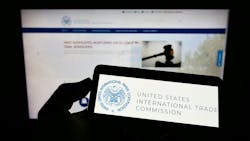Independent-party attorney finds Samsara's infringement claims 'invalid,' while a new lawsuit against Motive emerges
An independent-party investigative attorney looking into two competing transportation technology providers' patent infringement case raised questions about the validity of the International Trade Commission complaint.
Samsara, a trucking telematics and fleet management platform, filed an ITC complaint against rival Motive in February, alleging that the company infringed on three of Samsara’s patents. Last night, Motive announced a development in the case.
Additional Samsara and Motive infringement coverage:
Samsara files patent lawsuit against rival Motive
Samsara files another complaint against Motive
Motive countersues Samsara, alleging company poached engineers, stole AI tech
In a pre-hearing briefing, Megan Wantland, the investigative attorney at the Office of Unfair Import Investigations, an independent participant in the ITC investigation, stated that, in her opinion, Samsara’s claims of infringement are invalid, and Motive products do not infringe on Samsara’s patents for many reasons.
Regarding Samsara’s three infringement claims, the OUII, recorded as “The Staff,” states:
- U.S. Patent No. 11,190,373: “The evidence is expected to show that the asserted claims of the ’373 Patent are directed to an abstract idea and fail to recite an inventive concept sufficient to confer patentability. As such, the Staff expects the evidence to show that the asserted claims are invalid under 35 U.S.C. § 101.”
- U.S. Patent No. 11,127,130: “The evidence is expected to show that the asserted claims of the ’130 Patent are directed to an abstract idea and fail to recite an inventive concept sufficient to confer patent eligibility. As such, the Staff expects the evidence to show that the asserted claims are invalid under 35 U.S.C. § 101.”
- U.S. Patent No. 11,611,621: “The Staff believes there are likely some close calls as the field of vehicle telematics appears to be a crowded field of prior art. At this time, because of the presumption of patent validity, the Staff does not expect the evidence to clearly and convincingly show that the asserted claims are invalid.”
The briefing at one point uses the word "absurd" to describe Samsara's claim that Motive infringes on its '103 patent.
This is significant because of the influence the OUII has on the investigation. Not every ITC investigation is granted an OUII; an OUII, represented by a single attorney, is involved only in cases where their expertise is necessary or where they can provide the greatest value.
If an OUII is added to an investigation, they are typically involved in every aspect, from discovery to examination of trial witnesses. Because the OUII is an independent-party representation of the “public interest” and takes a position on all issues of the case, their support can have a “persuasive effect” on the investigation’s outcome, according to the Finnegan law firm, which specializes in intellectual property law.
“This confirms what we have known all along,” Motive stated. “Samsara's legal case was not about protecting IP; it was an attempt to limit competition and prevent customers from accessing the best technology. While Samsara pursues a losing strategy focused on litigation rather than innovation, at Motive, we remain focused on serving our customers and building exceptional AI technology that makes our roads safer.”
See also: Refrigerated fleet grows with Samsara tech
The OUII's statements do not reflect a decision on the case, however, as the ITC investigation is ongoing, with evidentiary hearings yet to take place. Additionally, the Administrative Law Judge presiding over the case will make the final judgment, which is not expected until the summer of 2025.
“Motive’s misrepresentation of the Staff’s preliminary views is an attempt to manipulate public perception with inaccuracies and premature conclusions," Adam Simons, a spokesperson for Samsara, told FleetOwner. "This is yet another example of Motive’s underhanded tactics and attempts to mislead the public.
"The judge overseeing this case has not ruled on the merits of Samsara’s claims. In fact, the judge has repeatedly rejected Motive’s efforts to end this investigation and invalidate Samsara’s patents, which is why all claims will be presented at our hearing beginning this Thursday. We remain confident that the evidence presented at the hearing will expose Motive’s pattern of infringement and systematic copying. We anticipate that the judge will issue an initial determination on all claims by March 2025, as directed by the scheduling order in the case.”
Motive hit with another Samsara lawsuit
Within mere hours of Motive’s announcement, Samsara filed another lawsuit against its rival–this time in California. This adds to the companies’ growing list of court involvement in their rival relationship.
Samsara’s new California lawsuit, made public on November 13, alleges that Motive’s leadership is responsible for stealing trade secrets from Samsara. Samsara identified Motive’s action as “a brazen scheme masterminded and executed by Motive’s CEO Shoaib Makani himself.”
“Motive has been covertly soliciting Samsara’s employees to leave Samsara for Motive,” the lawsuit states. It claims Makani instructed his employees to “extensively mine [former Samsara employees] for any and all information about Samsara’s proprietary information, business operations, and products.”
According to the filing, the lawsuit aims to end Motive’s alleged actions, which Samsara believes will not happen without court intervention.
"Samsara’s new lawsuit seeks to stop Motive’s calculated campaign—personally driven by Motive’s CEO and founder, Shoaib Makani—to steal and exploit our trade secrets to avoid the significant investments needed to independently develop its own business,” Samsara said in a statement.
See also: Motive launches First Responder service for commercial vehicle drivers
As with the earlier ongoing lawsuit as well as the ITC complaint, Motive refutes these allegations.
“Samsara’s latest lawsuit is yet another attempt to distract from the fact that Motive delivers superior AI technology and value to customers,” the company stated. “As evidenced in the ITC pre-trial briefing released last night, which concludes Motive did not infringe on Samsara's patents, it's evident that these baseless claims reflect a losing strategy focused more on litigation than innovation. At Motive, we remain focused on serving our customers and building exceptional AI technology that makes our roads safer.”
Samsara’s and Motive’s dicey history
The disputes between the two companies stretch even to the timeline of their product launches.
Samsara first launched its Vehicle Gateway product in 2016, a fact that neither company disputes. However, Samsara claims that Motive launched its version of the Vehicle Gateway three years later in 2019, while Motive claims its Vehicle Gateway launched in October 2015 when the company was known as KeepTruckin.
KeepTruckin, rebranded as Motive in 2022, debuts competing products shortly after Samsara. Samsara claims the “copycat” behavior can be identified on Motive’s website as well as the user interface of its products. Motive's allegations against Samsara are nearly identical.
In 2022, Samsara claims to have first identified that Motive employees had access to the Samsara dashboard through, what Samsara claims is “fake customer accounts.” Motive claims Samsara product leaders began creating accounts on its platform since 2016. By January 2024, Samsara filed a lawsuit against Motive.
A few weeks later, Samsara also filed an International Trade Commission complaint against Motive. Days afterward, Motive countersued.
Each case and investigation are still ongoing.
About the Author
Jade Brasher
Senior Editor Jade Brasher has covered vocational trucking and fleets since 2018. A graduate of The University of Alabama with a degree in journalism, Jade enjoys telling stories about the people behind the wheel and the intricate processes of the ever-evolving trucking industry.

